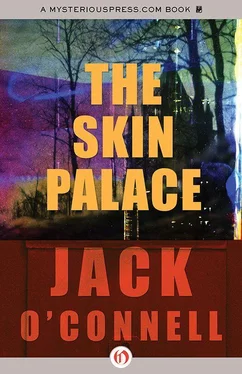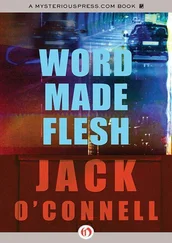And yet she can’t take her eyes off the screen. She watches as Dorothy bends the nail that has trapped the Scarecrow on his post in the cornfield for an eternity. She watches as the Scarecrow slides to the ground, tries to stand on rubbery legs, slides into “If I Only Had a Brain.”
She stares at the screen as Dorothy tells him her hopes for salvation in the Emerald City. And she focuses in tight as these two innocents join forces and break into this skipping promenade down their chosen pathway while reprising “We’re Off to See the Wizard.”
It’s possible that some offscreen voice, maybe even Victor Fleming’s, calls, “Cut,” but Sylvia doesn’t hear it. She knows for certain that the next scene should be the bullying apple trees. But Garland and Bolger are still in front of the cornfield. The music crashes into this dissonant confusion for a second or two, then returns in another form, something far removed from the light innocence of “If I Only Had a Brain.” Now they’re hearing a king of jazzy swing, but there’s no way to tell is this is part of the original sound track or was dubbed in at some later date. The music seems to fit the movements of the two figures on the screen, but it deviates enough for doubt.
The Scarecrow has taken Dorothy’s hand and is whirling her in and out of his arms, spinning her outward and retracting her into his straw-stuffed chest like a yo-yo. He catches her in an aggressive embrace and they start a polka-ish hoedown trot, circling around the perimeter of the yellow-brick dance area. Clearly, the film has broken free of any connection to the images of Sylvia’s memory. It’s a brand new world now, a place where she has no idea what’s coming. And she likes it a lot better. The vertigo, the inconsistency between what should be and what is, has vanished and all she wants to do is watch.
She gets a good look at Dorothy’s face as the screen dancers loop by their closest point to the camera. The girl from Kansas is howling, loving this moment, seemingly set free and basking in the spontaneity, the unscripted abandon of the Scarecrow’s improvisation. Here, in this moment of deviation, there’s no worry about budget or time schedules. There’s no fat-faced studio boss hollering about gained weight or contract clauses. There’s only the Scarecrow’s flying, steering arms and their intermingled, convulsing laughter.
They mutate their form into a tango, pivot at the far point from the lens and stomp back, cheek to cheek. Dorothy’s eyes closed up with laughter, until they’re grotesquely close to the screen and someone yells, “watch the camera” over the music. Scarecrow does a slapstick pratfall as if tripping over some unseen equipment and laughter erupts everywhere. He pretends to drop unconscious on the bricks and Dorothy stands over him for a minute, arms across her stomach, then hand up to her mouth to cover the uncontrollable laughter. With her back to the camera she steps over him, straddles the prone straw body and bends down, the pleats of the farm dress spreading across her rear. She begins to help the recovering Scarecrow up and he suddenly springs back to full-bodied life, bounds to his feet, sweeps Dorothy into the air. She lets her head fall back, her hair swinging in the rush, new waves of hilarity playing over her mouth.
Then Scarecrow goes into her neck, his floppy hat sailing away to the ground, a vampire-like flourish to his maneuver. The offscreen noise turns to hoots and whistles and the music shuts down. But a curious thing occurs, totally unexpected from the context of everything that’s led to this moment. Dorothy’s arms, limp in the air behind her one second, swing up and forward and wrap themselves around Scarecrow’s neck. And the strawman’s lips move and find the farm girl’s. And suddenly, instantly, in one bolt of adrenal fluid and muscular expansion, startling as the change from black-and-white to color, the playacting is over.
Sylvia is removed from the image before her by over half a century. But she’s absolutely certain that a change has taken place. The Scarecrow and Dorothy are French-kissing and the joker running the camera pulls in for a tight close-up and there’s a shocked electricity that passes from the now probably dead movie crew through the screen and into the Ballard Theatre and into Propp and Sylvia. The unmistakable charge of sexuality has exploded unexpectedly between the eternally virginal Kansas schoolgirl and the man made of straw and cloth. Mouth on mouth and eyes closed, their heads twist and the audience of two can feel the warmth that has to be expanding beneath the skin of the actors, inside their legs and stomachs, making their breath come faster and harder. And in that moment, Sylvia lets herself act without thought or preparation, totally and completely on instinct and impulse. She reaches down and puts her hand on Propp’s leg.
And without a word, he bolts out of his seat and races up the aisle stairs until he disppears into the projection room.
Sylvia closes her eyes and takes a deep breath and hates herslf for her stupidity.
She opens her eyes and on the screen the kiss is over and Dorothy pushes out of the Scarecrow’s arms, almost falls to the bricks and then runs out of screen view. And the Scarecrow is left embarrassed, staring at the camera without anything to say, without an explanation, until he too runs off in another direction, leaving wisps of straw drifting in the air behind him.
Oz vanishes and the screen is filled with black leader that has huge white letters and numbers written on it. Sylvia gets out of her seat and walks up to the projection booth. The door is open and the projector is still humming and cranking, but Propp, of course, is nowhere to be seen. There’s a square opening in the floor at the rear of the booth. She steps inside and looks to see a spiral staircase which she climbs down into a closet that leads out to the concession stand.
She leans on the candy counter and looks forward at the main entrance of the theatre. The double glass doors are pushed wide open, a set of keys hanging from an interior lock.
Sylvia stands still until her breathing calms and all she can hear is the slap-and-purr sound of the movie reel upstairs, the tail end of the film perpetually revolving on the take-up arm of the projector. She listens until she decides not to turn it off. She pushes her hands into the pockets of her coat to confirm what she already suspects. The film canisters are gone.
Then she moves out the front door and starts to walk home.
Jakob loves scouting locations. If some quirk of nature or God were to prevent him from being an auteur, he thinks he could still find a reasonable percentage of happiness as a set scout. He’s convinced he could be dropped from a plane into any locale on the planet — urban, suburban, full-blown rural — and he’d be able to find the exactly correct visuals for any hypothetical film in development. And in any art form so dependent on collaboration, scouting requires no interaction beyond that of his inner-eye and his outer eye.
It’s a question of determining coordinates, of uncovering real world field-sites that agree with the images already screened in the skull-cinema. You look at the printed page where the screenwriter has written.
EXT. TRAIN STATION — NIGHT
and you know, from the context of the narrative, from the endless number of movies you’ve seen in your life, from the specific throb in the center of your bone marrow, you know what this train station must look like.
It must look like this.
Like Gompers Station, Jakob decides, exactly like Gompers Station once the correct angles are established and the lighting is battled out and the dry-ice machine has pumped the perfect balance of smoke and water into the air.
Читать дальше











